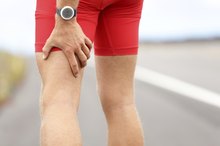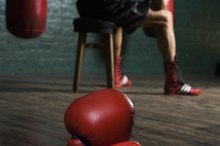Post-Workout Lymph Node Pain
Pain in your lymph nodes or body glands can be the result of swollen glands due to infection 12. However, pain in the areas surrounding your glands can also stem from an injury and the resulting radiating pains. Strenuous physical exercise can cause your immune system to slow down temporarily, which may leave you more susceptible to infection in the case of the common cold, flu or other sicknesses. Treatment of pain in your glands following exercise is possible, however, and can help alleviate these symptoms effectively.
If you are experiencing serious medical symptoms, seek emergency treatment immediately.
Swollen Lymph Nodes
Swollen lymph nodes can result from a variety of causes 1. Working out to an exhaustive degree can depress your immune system, thus leaving you more susceptible to infection if you also have a disease or condition such as the common cold, influenza, gingivitis, mononeucleosis, tuberculosis, or mouth sores. As your glands become infected, they will also swell in size and can cause pain in your body.
Chronic Fatigue
Pectoral Pain When Doing Pullups
Learn More
Pain in your glands can also be linked to an immunodeficiency medical condition, such as chronic fatigue syndrome, commonly called CFS. This is a chronic condition that can leave you feeling pain in your glands and overly tired or fatigued for a prolonged period. This is due to a slow or improperly functioning immune system, which can be made worse if you exercise to an extreme degree or to the point of exhaustion.
Injury
Feeling pain in the area of your lymph nodes and other areas of your body following a workout may also be the sign of muscle injury. For example, a muscle strain or ligament sprain can cause pain to radiate throughout the site of the injury and often into other areas of your body, especially in extreme injury cases such as muscle rupture. Proper form and attention to your muscle endurance thresholds is critical to the prevention of injury while exercising.
Treatment
How to Treat Severe Muscle Soreness From Weightlifting
Learn More
The treatment for your swollen or painful glands will depend on the cause of the swelling 2. For example, if you experience an infection in your body that causes your lymph nodes to swell, you will likely be prescribed antibiotics and other medication to fight this infection. If you have recently experienced an injury, however, resting and icing the sprained or strained area of your body will be a more beneficial form of treatment.
Related Articles
References
- MedlinePlus: Swollen Lymph Nodes
- NHS Choices: Swollen Glands
- Gaddey HL, Riegel AM. Unexplained lymphadenopathy: Evaluation and differential diagnosis. Am Fam Physician. 2016;94(11):896-903.
- Rajasekaran K, Krakovitz P. Enlarged neck lymph nodes in children. Pediatr Clin North Am. 2013;60(4):923-36. doi:10.1016/j.pcl.2013.04.005
- Kliegman RM, St Geme JW. Nelson Textbook of Pediatrics. 21st ed. Philadelphia, PA: Elsevier; 2019.
Writer Bio
Adam Fonseca has been a writer and blogger since 2005. He maintains a number of different blogs on a variety of subjects ranging from health care to golf. Fonseca has a Master of Health Administration degree from the University of Phoenix and degrees in health science and psychology from Bradley University.









